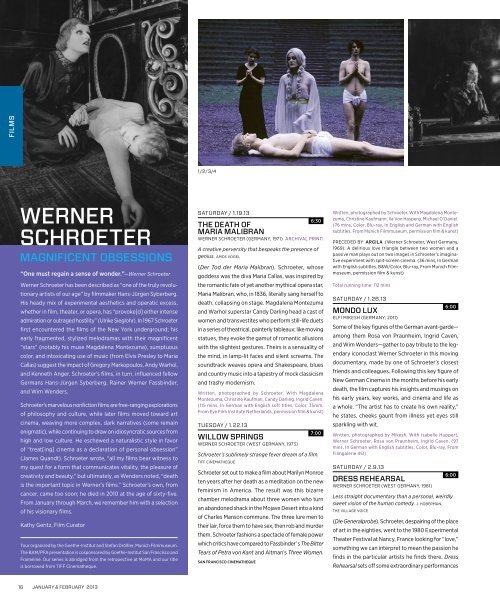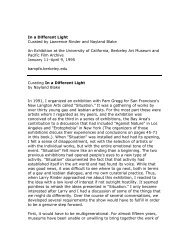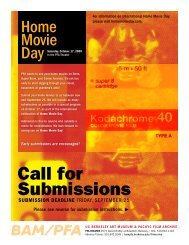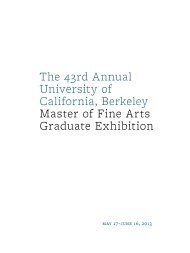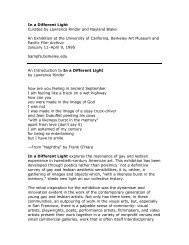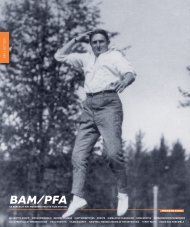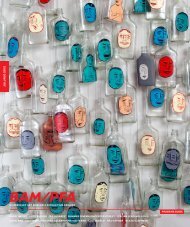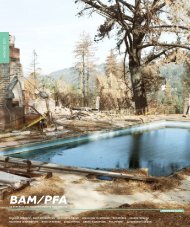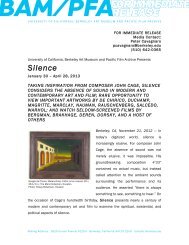January & February 2013 - Berkeley Art Museum and Pacific Film ...
January & February 2013 - Berkeley Art Museum and Pacific Film ...
January & February 2013 - Berkeley Art Museum and Pacific Film ...
- No tags were found...
Create successful ePaper yourself
Turn your PDF publications into a flip-book with our unique Google optimized e-Paper software.
FILMS1/2/3/4WernerSchroeterMagnificent Obsessions“One must regain a sense of wonder.”—Werner SchroeterWerner Schroeter has been described as “one of the truly revolutionaryartists of our age” by filmmaker Hans-Jürgen Syberberg.His heady mix of experimental aesthetics <strong>and</strong> operatic excess,whether in film, theater, or opera, has “provoke[d] either intenseadmiration or outraged hostility” (Ulrike Sieglohr). In 1967 Schroeterfirst encountered the films of the New York underground; hisearly fragmented, stylized melodramas with their magnificent“stars” (notably his muse Magdalena Montezuma), sumptuouscolor, <strong>and</strong> intoxicating use of music (from Elvis Presley to MariaCallas) suggest the impact of Gregory Markopoulos, Andy Warhol,<strong>and</strong> Kenneth Anger. Schroeter’s films, in turn, influenced fellowGermans Hans-Jürgen Syberberg, Rainer Werner Fassbinder,<strong>and</strong> Wim Wenders.Schroeter’s marvelous nonfiction films are free-ranging explorationsof philosophy <strong>and</strong> culture, while later films moved toward artcinema, weaving more complex, dark narratives (some remainenigmatic), while continuing to draw on idiosyncratic sources fromhigh <strong>and</strong> low culture. He eschewed a naturalistic style in favorof “treat[ing] cinema as a declaration of personal obsession”(James Qu<strong>and</strong>t). Schroeter wrote, “all my films bear witness tomy quest for a form that communicates vitality, the pleasure ofcreativity <strong>and</strong> beauty,” but ultimately, as Wenders noted, “deathis the important topic in Werner’s films.” Schroeter’s own, fromcancer, came too soon; he died in 2010 at the age of sixty-five.From <strong>January</strong> through March, we remember him with a selectionof his visionary films.Kathy Geritz, <strong>Film</strong> CuratorTour organized by the Goethe-Institut <strong>and</strong> Stefan Drößler, Munich <strong>Film</strong>museum.The BAM/PFA presentation is cosponsored by Goethe-Institut San Francisco <strong>and</strong>Frameline. Our series is abridged from the retropective at MoMA <strong>and</strong> our titleis borrowed from TIFF Cinematheque.Saturday / 1.19.136:30The Death ofMaria MalibranWerner Schroeter (Germany, 1971) Archival print!A creative perversity that bespeaks the presence ofgenius. Amos Vogel(Der Tod der Maria Malibran). Schroeter, whosegoddess was the diva Maria Callas, was inspired bythe romantic fate of yet another mythical opera star,Maria Malibran, who, in 1836, literally sang herself todeath, collapsing on stage. Magdalena Montezuma<strong>and</strong> Warhol superstar C<strong>and</strong>y Darling head a cast ofwomen <strong>and</strong> transvestites who perform still-life duetsin a series of theatrical, painterly tableaux; like movingstatues, they evoke the gamut of romantic allusionswith the slightest gestures. Theirs is a sensuality ofthe mind, in lamp-lit faces <strong>and</strong> silent screams. Thesoundtrack weaves opera <strong>and</strong> Shakespeare, blues<strong>and</strong> country music into a tapestry of mock classicism<strong>and</strong> trashy modernism.Written, photographed by Schroeter. With MagdalenaMontezuma, Christine Kaufman, C<strong>and</strong>y Darling, Ingrid Caven.(115 mins, In German with English soft titles, Color, 35mm,From Eye <strong>Film</strong> Institute Netherl<strong>and</strong>s, permission film & kunst)Tuesday / 1.22.13Willow SpringsWerner Schroeter (West Germany, 1973)7:00Schroeter’s sublimely strange fever dream of a film.TIFF CinemathequeSchroeter set out to make a film about Marilyn Monroeten years after her death as a meditation on the newfeminism in America. The result was this bizarrechamber melodrama about three women who turnan ab<strong>and</strong>oned shack in the Mojave Desert into a kindof Charles Manson commune. The three lure men totheir lair, force them to have sex, then rob <strong>and</strong> murderthem. Schroeter fashions a spectacle of female powerwhich critics have compared to Fassbinder’ s The BitterTears of Petra von Kant <strong>and</strong> Altman’s Three Women.San Francisco CinemathequeWritten, photographed by Schroeter. With Magdalena Montezuma,Christine Kaufmann, Ila Von Hasperg, Michael O’Daniel.(76 mins, Color, Blu-ray, In English <strong>and</strong> German with Englishsubtitles, From Munich <strong>Film</strong>museum, permission film & kunst)Preceded by Argila (Werner Schroeter, West Germany,1969). A delirious love triangle between two women <strong>and</strong> apassive man plays out on two images in Schroeter’s imaginativeexperiment with split-screen cinema. (36 mins, In Germanwith English subtitles, B&W/Color, Blu-ray, From Munich <strong>Film</strong>museum,permission film & kunst)Total running time: 112 minsSaturday / 1.26.13Mondo LuxElfi Mikesh (Germany, 2011)6:00Some of the key figures of the German avant-garde—among them Rosa von Praunheim, Ingrid Caven,<strong>and</strong> Wim Wenders—gather to pay tribute to the legendaryiconoclast Werner Schroeter in this movingdocumentary, made by one of Schroeter’s closestfriends <strong>and</strong> colleagues. Following this key figure ofNew German Cinema in the months before his earlydeath, the film captures his insights <strong>and</strong> musings onhis early years, key works, <strong>and</strong> cinema <strong>and</strong> life asa whole. “The artist has to create his own reality,”he states, cheeks gaunt from illness yet eyes stillsparkling with wit.Written, photographed by Mikesh. With Isabelle Huppert,Werner Schroeter, Rosa von Praunheim, Ingrid Caven. (97mins, In German with English subtitles, Color, Blu-ray, From<strong>Film</strong>galerie 451)Saturday / 2.9.13Dress RehearsalWerner Schroeter (West Germany, 1981)6:00Less straight documentary than a personal, weirdlysweet vision of the human comedy. J. Hoberman,The Village Voice(Die Generalprobe). Schroeter, despairing of the placeof art in the eighties, went to the 1980 ExperimentalTheater Festival at Nancy, France looking for “love,”something we can interpret to mean the passion hefinds in the particular artists he finds there. DressRehearsal sets off some extraordinary performances16 january & FEBRuary <strong>2013</strong>


